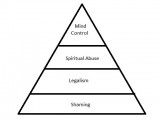 God saved us by his grace (Eph 2:8-9). There is nothing that we did to earn his favor. Spiritually, we were dead! Salvation is a free gift that God freely chooses to give us out of his incredibly huge wealth of kindness.
God saved us by his grace (Eph 2:8-9). There is nothing that we did to earn his favor. Spiritually, we were dead! Salvation is a free gift that God freely chooses to give us out of his incredibly huge wealth of kindness.
The apostle Paul was so consumed with thinking about God’s grace that he named it over 150 times in his epistles in the New Testament. Paul’s discussion of grace is interwoven all through his discussion of God’s entire plan for Salvation, from the moment we are saved until the moment we are received into glory. Paul was God’s messenger to bring the Good News to the Gentiles. And when Paul talked about the Good News, he often spoke of grace. To misunderstand grace is to misunderstand Paul’s message of Good News.
But what is grace? Harry Ironside has been quoted as saying “Grace is the very opposite of merit… Grace is not only undeserved favor, but it is favor, shown to the one who has deserved the very opposite.” God’s grace is God’s favor poured out on those who deserve it the least.
A scene from the life of David is an image of undeserved favor. The house of David and the house of Saul had been at war. By the customs of the day, the people would have expected a bloody battle with a bloody conclusion: the winner putting to death as many of the losers as possible. Saul fought a dirty war but in the end God caused Saul to be defeated. One man on the losing team had a long name and a short step. Mephibosheth. He felt fear the day he was whisked away in a chariot to face king David’s throne. He bowed before the king, having nothing to offer and expecting the worst. But David told him not to fear. The lame man from the losing team was now invited to the king’s house, to live at a royal standard, to eat at the king’s table. Mephibosheth had no reason to expect David’s kindness and favor; David gave it freely of his own choice. David’s kindness is a small picture of the undeserved favor, or grace, God shows to us.
This grace, however, cuts against the grain of human nature. Pagan religions told of angry gods who needed to be appeased by people doing or sacrificing something. Adam and Eve sewed fig leaves to lessen the impact of their sin. Job’s comforters assumed Job had done something deserving of punishment and urged to do something to regain God’s favor. We instinctively know we fall short and we want to DO something.
William Ernest Henley’ words resonate deeply inside the human heart: “I am the master of my fate, I am the captain of my soul.” We do not naturally want to bow helpless before God. We want to bring something, do something. But Jesus did not come to show favor to those who deserve it or have earned it. He came for those who could never earn it. Salvation requires giving up being the master of our own fate and saying instead, “nothing in my hand I bring, simply to thy cross I cling.”
What does this have to do with Bill Gothard? Anyone who has been to an Institute in Basic Life Principles’ Basic Seminar will likely remember Mr. Gothard giving a definition of grace similar to the one that currently appears on his website: “the desire and the power that God gives us to do His will.” This sounds good at first but notice what happens when you use that definition in the context of Eph 2:8-9. The meaning changes drastically. “For by the desire and power that God gives us to do His will you have been saved through faith…” Suddenly, salvation becomes a matter of behavior rather than God’s free gift. This is one reason why so many of Mr. Gothard’s followers have abandoned Christianity. When our salvation is based upon something WE do rather than what GOD does, eventually a person will grow disillusioned, frustrated, and spiritually suicidal.
The problems created by Mr. Gothard’s definition of grace go to the heart of the gospel. Pastor Tim Keller has said, “The essence of other religions is advice; Christianity is essentially news.” Other religions offer advice for how you should live in order to be connected to God. Christianity joyfully reports the good news: Jesus Christ has already lived and died in order to connect you to God.
Compare this to our opening description of grace in the context of Eph 2:8-9. “For by the undeserved favor that God has shown to those who deserve the very opposite you have been saved through faith..” This is the joyful report of the gospel. Out of his wealth, God freely chooses to pour out his favor on those who receive it by faith. Nothing you can do will earn you more favor, nothing you can do will earn you less favor. It is God’s free choice to pour out his favor on those who do not deserve it, it is your choice to receive it by faith.






















"Where Christ resides - there is no place for the Law, sin, wrath and death. Instead, now there is nothing but GRACE, righteousness, joy, life and filial confidence in the Father, who is now appeased, compassionate and reconciled. How is it possible that after this, now I should banish Christ, destroying his kingdom, which was planted in me through the gospel, and re-establish the Law?"
Martin Luther
This one foundational twisting of the doctrines of scripture in and of itself is enough to explain most of the practical problems we saw in ATIA. (...and to say the least, this was far from the only example of profound disrespect for the plain teaching of the Bible.)
Amazing desire and power that God gives us to do His will, how sweet the sound, that saved a wretch like meeee.... You're right, it doesn't have quite the same ring to it!
LOL, Eric. There is a serious truth to that: part of our human reaction against grace is that we don't truly want something that is completely undeserved, completely outside our control. We would like to purchase a little something extra. We try to make "a wretch like me" mean "but not as much of a wretch as him/her."
Great article on grace. Phillip Yancey called grace "The last, best word." in his book, "What's So Amazing About Grace?"
When questioned what separated Christianity from every other religion, C.S. Lewis' is reported to have responed, "That's easy, it's grace."
Not only is it by grace we are saved, but it is by grace we are sancified and will be glorified with Jesus Christ. Amazing grace indeed!
amen
Not only does Gothard redefine grace, but he tacks on requirements for receiving it. Here's I quote I jotted down verbatim from the Basic Seminar videos:
"The only way we get God's grace is by humbling ourselves."
That says it all. :/
that's the foundation of the whole problem in a nutshell. i have those notes in my own book as well. yikes.
I especially love the Keller quote, Matt. What a freedom that faith is believing the good NEWS rather than correctly heeding the right ADVICE.
Great article, Matthew! Thanks for writing it.
Great article! After wrestling for years with the BG definition of grace, I started teaching Awana and was so happy to learn their definitions:
Grace- God giving me what I don't deserve, and
Mercy- God not giving me what I deserve
If I still believed the BG definition I never would have named my daughter 'Grace'.
Oh wow!!! I really love those definitions of Grace and Mercy!!!! Awesome!!! My dad and I were debating grace after he read this and I couldn't get my tongue around what I wanted to say. So I said something like, we simply accept and accepting is believing and believing is faith. It's all the same but it is the only thing we do. The rest is what He did. But that is exactly it, He did it all and we don't deserve it!!
Thank you, Matthew! I think one thing Gothard really misses is that, not only is Salavation by grace, but so is the ongoing process of sanctification, not of works, lest any should boast. I believe that with all his rules and "principles" he espouses for daily living of the Christian life, he certainly leads people to believe the opposite. Paul addresses this practice in the book of Galatians: "Who has bewitched you? Having begun in the Spirit, are you then made perfect by works of the flesh??" [my paraphrase]
amen. and amen.
Thank YOU, Hannah. Well said. That question in Gal 3 rings out very clearly against gaining some kind of spiritual standing with God through the efforts we put out or the standards we impose. That is right at the heart at heart of what Recovering Grace hopes to communicate because we believe it is at the heart of the gospel.
I've shared this elsewhere:
Although I had questioned many things, and quite often agreed 'in principle' on different points of IBLP/ATI dogma or practice while having my own definition that I was more faithful to, I also mostly just went along, frequently shaking my head in bewilderment.
Then, One Fine Day in Moscow...
I was walking around, with my 10 commandments pamphlet that we'd all been given, to 'memorize and meditate on', generally musing on how/why things were so screwed up in my head and in the training center, while halfheartedly trying to memorize and be a 'good kid' for change.
For some reason, the pamphlet just wasn't helping.
So I pulled out my trusty pocket New Testament, and for unknown reasons began reading in Galatians 3... Revelation!!
"Hey, What the Heck?? This coulda been written about us here at the good ol' MTC!"
And so began the demise of the Gothard mindset that had insinuated itself into my impressionable young head. =)
Will, it's always a dangerous thing to get that Bible out and start reading it for what it says! Thank you for sharing this story, friend. I keep hearing this from others, and it was true for me, too, that one day Galatians appeared on their radar and things were never the same.
Matthew, Thanks for your very well written article on Grace. You are right! Grace comes from Jesus Christ alone. There is nothing that we can do to earn it or even to deserve it. It's Jesus alone. It's His free gift to us. The only thing that we can do is accept it or deny it. I chose to accept it 26 yrs. ago. To God be the glory great things He has done! "In Christ alone my hope is found. He is my light, my strength, my song."
Grace, wow, it just changes everything in life, doesn't it. I've only fully begun to recognize how many years I have lived under the false assumption that I am sanctified by my works. It is hard to undo years of this thinking, but worth the pain and fight. I started reading Transforming Grace by Jerry Bridges. It has been extremely helpful in helping me unpack my inconstant thinking in regards to Grace.
"We want to bring something, do something. But Jesus did not come to show favor to those who deserve it or have earned it. He came for those who could never earn it. " I heard a message a few months ago that was one of my personal "aha" moments. It was the parable of the prodigal son. Only the speaker took the story further than the straying son's homecoming. He paralleled how both sons - the prodigal & the righteous - were desperate to offer something to their father to earn his favor. The erring son wanted to offer service/penance. The elder son believed his RIGHTEOUSNESS entitled him to the father's favor. Neither son understood that it didn't matter how bad or how perfect they had lived. Their father loved them both, equally, without hesitation, and wanted good things for them. The moment I understood this, was the moment I was able to begin laying down my *righteousness* and begin this journey of bare-boned trust with Jesus.
I've been recommended Uncensored Grace. Haven't picked it up yet, but it's on my must-read list.
well written Matthew!
Thank you
Great thoughts, Sarah. Was that by chance Tim Keller's 'The Prodigal God'? If not, you would really enjoy that book/talks. Really goes after 'elder-brother righteousness.'
Kevin, I'll second your recommendation of Keller's 'The Prodigal God'! It was especially challenging to me, personally, when he pointed out that both sons were more interested in the Father's gifts than they were the Father himself, or a personal relationship with Him. I was humbled to realize how often I have tried to 'use' God to get the results or things that I want. This is another book that has pointed me back to my need to pursue a relationship with God above all else.
Thank you so much for writing this article. I am 25 years old and am just now realizing what grace really means in my walk with Christ. It's such awesome freedom! I feel like I'm worth SO much more in God's eyes and I it makes me so much more grateful for what He did.
Great article on an essential topic! I think this issue of the definition of grace sums up the flaws with IBLP/ATI because most of them stem from a works-based mindset. If you look at Mr. Gothard's definition, "the desire and power to do what's right", there are two problems. First, you are assuming the desire is there. I don't know about you, but frequently I know what's right and I have no desire to do it!!! Secondly, it's still all about US. We have to DO something instead of rejoicing in what has already been done for us on the cross.
[...] of God’s grace. When I found the book “A Matter of Basic Principles” and saw Bill Gothard’s definition of grace explained, I finally understood myself and what drove me to work for God’s acceptance. I have discovered [...]
[...] me appear “normal,” but the way I viewed the world was not normal at all. I was taught the wrong definition of grace through my entire childhood! It wasn’t until I went to seminary that I learned about [...]
[...] A leads to B, and because B is so desirable, A becomes nothing more than a means to that end. There is no room for grace in the picture. If we follow this logic to its natural conclusion, then God is nothing more than a vending machine [...]
[…] think I’m doing really well in my “recovery” from ATI (Advanced Training Institute). I know grace can’t be earned, I understand the danger of making everything in the Bible a principle, I work really hard to not […]